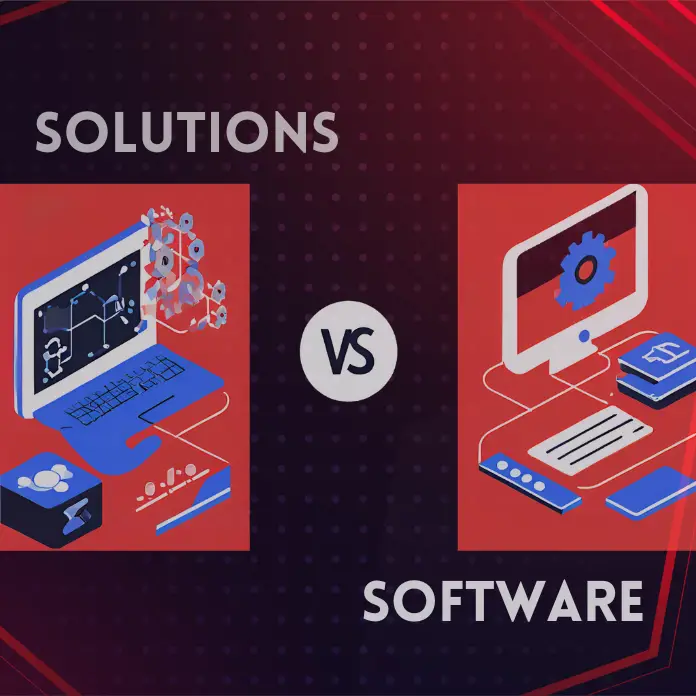
The choice between data integration software or a custom data integration solution revolves around one element - your business' needs.
Author: Patty Brehm
In the world of e-commerce and integration between trading partners in the supply chain, not all solutions are created equal. Let’s dive into what you need to consider when looking at “out of the box” software versus a more tailored managed data integration solution.
Think About Your Organization’s Needs and Processes
Software
Data integration software serves as the proverbial “off-the-rack” solution. The software includes predefined features and functionalities to facilitate the transmission, reception, and processing of electronic documents among trading partners.
Purchasing data integration software can be a very hands-on process. Before you choose software, you’ll be looking at different specs that work with your company’s infrastructure, as well as different pricing models. For example, a data integration software provider may charge your organization a yearly subscription or a per trading partner fee. Other software providers may offer pricing per transaction, or the volume of data processed through the system.
After paying the initial fee, you may also have additional costs to consider such as ongoing maintenance and personnel costs you may need to keep your software up and running. You may work with the software provider’s support team, but you’ll still need the in-house “know-how” to make things run seamlessly.
Value-Added Network (VAN) Provider
Working with a Value-Added Network or VAN provider for your EDI/API needs is akin to going to a tailor for a custom suit. You may have an idea of what your organization is looking for, but how “hands-off” or “hands-on” you are in the process is up to you. A VAN provider like Kleinschmidt offers data integration solutions customized to your business, large or small.
There are many ways a VAN provider can customize a solution to specific business needs. VAN providers offer everything from EDI, APIs, and any-to-any integrations. APIs are especially important as they have grown in popularity due to the rapid request-response nature. Your trading partners may choose to adopt API integration. As a result, you run into the unique challenge that a trading partner’s API is inherently custom. Not all API specifications are alike, so you’ll want to make sure that the software or solution you choose can manage the requirements of multiple trading partners with potentially different APIs. This adds a layer of complexity for your in-house staff or consultants to build and fine-tune these connections.
Consider another scenario: your company may have invested in a companywide TMS (Transportation Management Software), ERP (Enterprise Resource Planning System), or WMS (Warehouse Management System). You have the tools to manage your supply chain data, but you may not have the people who can dedicate time to integrating an EDI to API connection with your existing infrastructure. You might want to enlist the help of a VAN provider to manage the integration for you, especially when time is tight, and bandwidth is short.
Your Supply Chain is Unique
Can the software or solution you choose handle your existing IT infrastructure? For example, tailored B2B connectivity solutions are crafted to work with the unique requirements of your trading partners. The companies you message will have everything from legacy systems from the ’70s to modern logistics management programs, a customized EDI to API solution can help fit into your existing IT infrastructure while allowing you to scale—no matter what kind of data transformation you need. In this case, your connectivity vendor will establish and evaluate the connections and maintain them if the requirements change over time.
Versatility in Data Transformation
Data comes in a multitude of formats—from CSV to XML to JSON and beyond. Standard EDI software may stumble when confronted with the intricacies of diverse data types and complex data transformations. This rigidity can hamper your operational flexibility and impede compliance with ever-evolving industry standards.
A managed solution or VAN provides versatility and a team of specialists that are equipped to manage a wide array of data transformations. Whether you need to seamlessly convert XML to JSON, perform intricate data enrichment, or accommodate proprietary data structures, a customized solution can be finely tuned to match your specific demands. This unparalleled adaptability ensures that your business can effortlessly align with industry standards and integrate seamlessly with partners wielding different data formats.
Are Custom Data Integration Solutions Right for You?
The choice between standard software and a managed/VAN solution hinge on your business’s unique needs and long-term goals. If you are looking for control and data integration that fits your unique supply chain, the tailored approach may be for you. Tailored integration solutions promote efficiency with an existing infrastructure and a team of knowledgeable experts who can do the “heavy lifting,” allowing you to focus on the core priorities of your business.